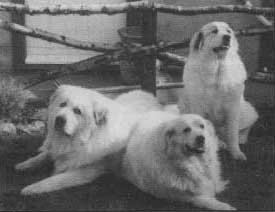(Extracts from the Hanbook of PMDC of GB - Copies available from the Secretary)
Taking Your Puppy Home
It is
advisable to plan well in advance when you want a puppy
as the last thing a new puppy needs is to arrive at its
new home just prior to Christmas (responsible breeders
will not allow puppies to leave them at this time) or
when a family holiday is planned which could disrupt the
puppy's routine as a critical time in its development.
To avoid problems it is worth checking beforehand
whether the breeder expects to be paid in cash or by
cheque as, bearing in mind past incidences, some
breeders won't accept cheques for puppies. Your pup's
breeder may insist on delivering it as this will enable
them to see where the puppy is to spend its life, but if
you are to collect it  then plan the
journey so that you don't have to stop on the way home
if the puppy is not old enough to have been fully
inoculated, as contact with other dogs or land on which
they have been, must be avoided at all costs. Take with
you plenty of newspapers or old towels because even
though older dogs are usually enthusiastic car
travellers this is not always the case with puppies and
several short journeys may be necessary to acclimatise
your pup to travelling. A large box placed on the back
seat next to a passenger, if possible, with some
interesting "toys" for the puppy, is useful on a long
journey. This gives the puppy a feeling of security,
more so than being held for a long time unable to move
about. Let the breeder know in advance of the time that
you plan to collect the puppy and request that it is not
fed for four or five hours beforehand and that its
drinking is kept to a minimum. Experienced breeders will
do this automatically but if you are buying from someone
with their first litter they may not have thought of
this.
then plan the
journey so that you don't have to stop on the way home
if the puppy is not old enough to have been fully
inoculated, as contact with other dogs or land on which
they have been, must be avoided at all costs. Take with
you plenty of newspapers or old towels because even
though older dogs are usually enthusiastic car
travellers this is not always the case with puppies and
several short journeys may be necessary to acclimatise
your pup to travelling. A large box placed on the back
seat next to a passenger, if possible, with some
interesting "toys" for the puppy, is useful on a long
journey. This gives the puppy a feeling of security,
more so than being held for a long time unable to move
about. Let the breeder know in advance of the time that
you plan to collect the puppy and request that it is not
fed for four or five hours beforehand and that its
drinking is kept to a minimum. Experienced breeders will
do this automatically but if you are buying from someone
with their first litter they may not have thought of
this.
Arriving Home
This can be a very traumatic time for a puppy as, having possibly just undertaken its first car journey and arriving in new surroundings, it will also be the first time it will have been away from its litter brothers and sisters. Take the puppy to the area of the garden you would prefer him to use for relieving himself and put him down gently. It can't be stressed enough that at this age despite seeming quite substantial, all the weight is supported by muscles, tendons and very soft pliable bone so care must be taken to avoid and sudden pressure on the joints as this can cause irreparable damage. Next, offer him a drink which he may well be ready for and a light meal which he may refuse. Before introducing him to his sleeping quarters, take him to the "toilet area" as it is important part of a puppy's early training that it learns to relieve himself after every meal especially if he is to live in the house. If there are children in the house then make sure they realise how important it is to the puppy that he is left to sleep peacefully when he wants to. A tired puppy can be just as irritable as a tired child!